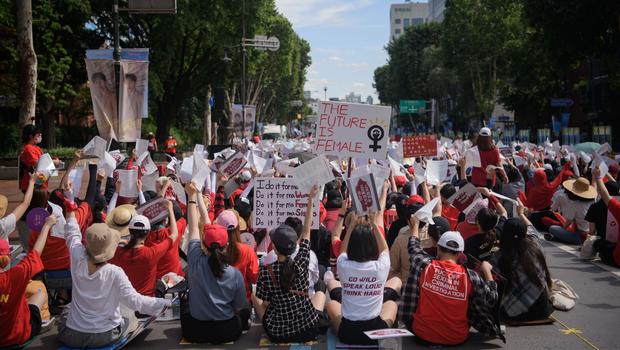

The women staged the protest to urge South Korean government to come up with measures to tackle sexual abuse involving hidden cameras.Ĭalls for solutions were constant and desperate even before the rallies, as South Korean women woke up to the seriousness of the problem over the past few years. South Korean women protest against sexism and hidden-camera pornography. The other part is what Yoon-Kim Ji-young of Konkuk University's Institute of Body and Culture calls "the most backward culture of misogyny" in South Korea. With South Korea's fast Internet speeds and high rate of smartphone ownership, "This kind of distorted sexual culture is becoming the norm," warns professor Lee Sue-jung, a criminal psychologist at Kyonggi University, outside Seoul.īut easy access to advanced technology is just part of the picture. Anyone can contact the seller, who is often the one who shot the film, and get gigabytes of voyeuristic videos for pennies. Thumbnails of such videos, tagged with an estimated age of the filmed women or the filming location, are posted with a messenger ID. With the right search words in Korean, it is not difficult to find pictures and videos of women in bathrooms and changing rooms on file-sharing platforms and social networks such as Tumblr and Twitter. Once filmed, molka videos are quickly shared online. In September, during a search, she stumbled on a video of herself from that December day.
#Korean spy cam scandal archive
Thinking of her kits as a "stopgap," Chung also started building an archive of illicitly recorded videos and pictures she found online to demonstrate how serious the problem is. Six months after her bathroom incident, Chung decided to act and put together her own "emergency kit" to thwart molka, or hidden cameras.

The fear of digital peeping Toms has led women to stuff tiny balls of toilet paper into holes they find in public bathroom stalls or cover the holes with tape. Police data show that the number of "illegal filming" crimes sharply increased from 1,353 in 2011 to 6,470 in 2017. In South Korea, microcameras installed in public bathrooms for surreptitious filming are an everyday concern. Her fear spiked, she says, when she saw the intruder and "realized I can actually be a victim." Like many other South Korean women, Chung, 26, constantly worries that she could be secretly filmed in private moments. Last winter, when Chung Soo-young saw a man rushing out of the women's restroom at a chain coffee shop in downtown Seoul, the first thing she did was to scan all stalls in search of a hidden camera. Some 70,000 women in August gathered in central Seoul, holding signs saying, "My life is not your porn." It was the fourth protest this year condemning the prevalence of hidden-camera crimes.


 0 kommentar(er)
0 kommentar(er)
